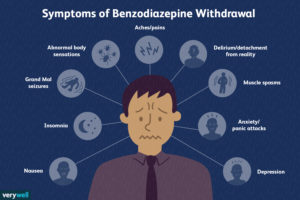What is Benzodiazepine Use Disorder?
Benzodiazepine addiction treatment can be difficult. Benzodiazepines, commonly referred to as “benzos,” are prescription sedatives. Doctors will sometimes prescribe benzos to treat anxiety or panic disorders, as they create a tranquil feeling. They are also used to treat insomnia and seizures. Unfortunately, benzos are also highly addictive, so many patients develop a sedative use disorder, also known as hypnotic use disorder or an anxiolytic use disorder.
To determine whether someone has a sedative use disorder, the National Association of Addiction Professionals recommends looking for these attributes:
- The person needs to use higher and higher amounts of the substance to receive the effect
- A high percentage of the person’s time is consumed with obtaining more of the benzo, using it, and recovering from it
- The person uses the sedative for a much longer time that originally intended
- The person has cravings and withdrawals when not using it
- The sedative interferes with the responsibilities of daily life
What are Types of Benzodiazepine?
Oakvine’s benzo rehab treatment center understands the complexities of this substance use disorder. This drug has many different names. Benzos are usually referred to their branded drug names, which are:
- Niravam
- Ativan
- Xanax
- Librium
- Klonopin
- Valium
- Halcion
- Restoril
- Tranxene
- Alprazolam
What are the Symptoms of Benzo Addiction?
Once someone starts abusing benzos, they can experience physical, behavioral and psychological symptoms. This is when benzodiazepine addiction treatment is needed. Some of the effects include the following:
- Physical impairments. These can include being physically weaker and loss of motor coordination.
- Lack of self-defense. While in the midst of a benzo addiction, the user may not be able to defend themselves from physical attacks.
- Difficulty seeing. Abuse of benzos can lead to blurred vision.
- Impaired thinking. Someone suffering from benzo use disorder may lack judgment, make poor decisions, or get confused easily.
- Inability to breathe normally. Benzos can restrict breathing, which can of course lead to additional physical dangers.
- Mood swings. Benzo use disorder often causes the user to shift moods, often in uncharacteristic ways.
- Social withdrawal. The user might avoid friends, family, and daily responsibilities.
- During benzo abuse, the user could become overly concerned about how much of the sedative he/she has.
- Risky financial activity. Someone begins to make unusual decisions such as maxing their credit cards, borrowing money and stealing in order to pay for the benzos.
- Disheveled appearance. The person takes less care in their personal appearance, from clothes to grooming.
What Are the Long Term Effects of Benzo Drug Addiction?
We work tirelessly for our clients to achieve recovery as we aim to be the first call when individuals need treatment at a benzo addiction treatment center. Benzos can also put the user at risk of the following long-term effects:
- Extreme weight loss. Benzos decrease a person’s appetite, which can lead to weight loss and even anorexia.
- The effects of benzo use disorder can include a return of previous anxieties, anxiety around finding more sedatives, and paranoia.
- Once the user’s brain becomes accustomed to receiving benzo-related sedation, normal sleep patterns can become disrupted.
- The body might also react to benzo abuse through tremors and muscle spasms.
- Loss of memory. Long-term users can cause permanent memory damage.
What is the process at our Benzo Addiction Treatment Center?
Oakvine utilizes skilled therapists and medical professionals to create custom treatment plans for all of our patients. We design your plan around the following established treatment types:
- With our supervision and help, the patient will gradually decrease the amount of benzos ingested over a predetermined timeline.
- Cognitive behavioral therapy. This type of treatment is all about recognizing destructive behaviors and triggers for benzo usage along with effective ways to cope with them.
- Contingency management. Reward-based treatments motivate the patient to refrain from using benzos.
- Group therapy. We often recommend the emotional support that group therapy can offer, from identifying with others suffering from benzo use disorder to sharing your own thoughts and emotions.
- Family therapy. We know that benzo abuse can lead patients to turn their backs on family, so our skilled counselors can work with all of you together to mend relationships and gain more support.
- After-care planning. Oakvine will also help you envision and achieve life after your recovery from benzo addiction.
Call our Austin Texas Benzo Addiction Treatment Center Now
Benzo addiction treatment requires specific knowledge and experience. We’re here and ready to help. Simply call or email and Oakvine’s professional staff will help you begin your journey to recovery. If you need help for yourself or a loved one, you can contact us at 1-888-973-7779.




